
![]() Throughout the 1960s, Brazilian pianist Dom Salvador (aka Salvador da Silva Filho) worked in a series of bossa-samba jazz combos, and professionally backed top-name artists such as Elis Regina, Jorge Ben and Edu Lobo. In the early '60s he jammed with Paul Winter when the West Coast jazzman made his fabled Brazilian pilgrimage, and later formed his own band, a pretty swinging, compact jazz trio. Salvador later made the transition into playing pop and funk, forming the funk band Abolicao, which is considered one of the key bands of the early 1970s Brazilian "Black Rio" R&B scene. Salvador took part in countless jazz sessions; this discography covers his own albums and some of the most notable sessions he played for other artists.
Throughout the 1960s, Brazilian pianist Dom Salvador (aka Salvador da Silva Filho) worked in a series of bossa-samba jazz combos, and professionally backed top-name artists such as Elis Regina, Jorge Ben and Edu Lobo. In the early '60s he jammed with Paul Winter when the West Coast jazzman made his fabled Brazilian pilgrimage, and later formed his own band, a pretty swinging, compact jazz trio. Salvador later made the transition into playing pop and funk, forming the funk band Abolicao, which is considered one of the key bands of the early 1970s Brazilian "Black Rio" R&B scene. Salvador took part in countless jazz sessions; this discography covers his own albums and some of the most notable sessions he played for other artists.
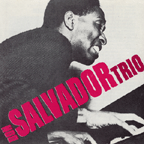 Dom Salvador "Don Salvador Trio" (Imagem, 1965)
Dom Salvador "Don Salvador Trio" (Imagem, 1965)


Throughout the 1960s, Sao Paulo pianist Dom Salvador (aka Salvador da Silva Filho) worked in a series of bossa-samba jazz combos, and professionally backed top-name artists such as Elis Regina, Jorge Ben and Edu Lobo. In the early '60s he jammed with Paul Winter when the West Coast jazzman made his fabled Brazilian pilgrimage, and later formed this outfit, which was a pretty swinging, compact jazz trio. Although some of the tracks here are similar to the fairly commonplace instrumental efforts of contemporary acts such as the Tamba Trio, et al, there's also a high proportion of more melodically rich, compelling material, including several romantically graceful themes. Almost all the songs were original compositions, showing Salvador clearly a cut above his Brazilian jazz brethren. Sure, for serious jazz fans this might have its limitations, but in the Brazilian sphere, these sessions definitely stand out.
Rio 65 Trio "Rio 65 Trio" (Philips, 1965)

With drummer Edison Machado and bassist Sergio Barroso...
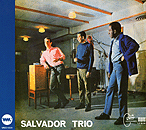 Salvador Trio "Tristeza" (Mocambo, 1966)
Salvador Trio "Tristeza" (Mocambo, 1966)


Another fine example of Salvador's lyrical leanings, and his ability to stand above the crowd in Brazil's somewhat clattersome bossa-jazz scene. As on his earlier albums, Dom Salvador excels on slower, more romantic numbers, and several good ones are collected here, as well as some sleek Latin jazz numbers. Edison Machado fills in on drums, and his work is also pretty solid... much better than most of their contemporaries! Includes a few original tunes, as well as covers of early Joao Donato and Chico Buarque tunes.
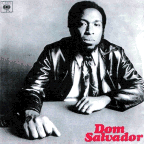 Dom Salvador "Dom Salvador" (CBS, 1969) (LP)
Dom Salvador "Dom Salvador" (CBS, 1969) (LP)

A fascinating transitional album, with pianist Dom Salvador making the move from straight jazz into funkier territory, stopping between the two by making a remarkably vigorous easy-listening instrumental album. With super-funky piano work and snare drums worthy of The Meters, this set has a lot to offer fans of 'Sixties instrumental pop. A stray cuica wiggle here and there (an a tough, funky cover of "Asa Branca") may remind us that this is a Brazilian album, but mostly this is music that could easily have been made up North, by someone like Young-Holt Trio, et. al. One thing that's nice is that you really hear Salvador's piano chops more than on the jazz and (especially) the funk records -- the music's a little goofy, but you can hear him cutting loose on the ivories... Billy Preston, eat your heart out!
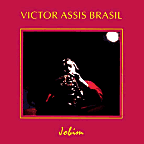 Victor Assis Brasil "Jobim" (Quartin, 1970)
Victor Assis Brasil "Jobim" (Quartin, 1970)


Salvador plays piano alongside saxophonist Victor Assis Brasil on an album consisting of four lengthy jazz interpretations of classic compositions by Antonio Carlos Jobim: "Wave," "So Tinha De Ser Com Voce," "Bonita" and "Dindi." Also on deck are drummer Edison Machado, guitarist Helio Delmiro, and Edson Lobo on bass. Solos are mainly by Assis Brasil, although Salvador gets some nice improvisational passages, particularly on the fourteen-minute long version of "Wave," and Delmiro's solo on "So Tinha..." which is also pretty nice. This is the kind of jazz where the original, overt melody is often left far behind as the players stretch out and jam. Personally, I find the saxophone to be a mildly irritating solo instrument, especially on extended flights, so I might not be the right person to give a recommendation, pro or con, for this artist. Still, even a heathen like myself can recognize that this is a pretty serious jazz album, particularly given the stylistic limitations of Brazilian jazz in the previous decade. Worth checking out, if you're a dedicated jazzhound.
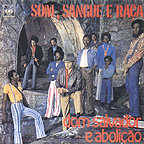 Dom Salvador E Abolicao "Som, Sangue E Raca" (CBS, 1971)
Dom Salvador E Abolicao "Som, Sangue E Raca" (CBS, 1971)


In the late '60s, Salvador formed this outfit, an all-black band that was one of the early fixtures on the "Black Rio" soul scene... This is a historically pivotal album, though some may find the album's mainly-instrumental performances a bit breezy... the vocal numbers are generally more exciting. The soul side is reminiscent of early Joe Cocker, perhaps, and the instrumental flights are not far removed from Brazilian jazz acts such as the Tamba Trio, et al. and also includes a bit of traditional material, such as modernized forro and the like. Compared to North American soul artists like Sly Stone or even Arthur Conley, this is pretty lightweight, but it does grow on you.
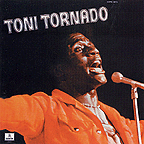 Toni Tornado "B. R. 3" (Odeon, 1971)
Toni Tornado "B. R. 3" (Odeon, 1971)

Salvador provides backing for this early Brazilian soul album, along with slew of well-known jazz and soul musicians, including Paulo Moura and guitarist Waltel Branco. Apparently Tornado was a television actor who briefly made the move into a music career, as a pioneer of the Black Rio scene. His debut on the Odeon label is nearly indistinguishable from similar hard-edged funk by Tim Maia, an uneasy, back-and-forth mix between the machinegun yelps and growls of James Brown and the softer crooning of the Philly crowd. Not earthshaking, but worth checking out if you're tracking down these old soul albums.
Dom Salvador "My Family (Minha Familia)" (Muse Records, 1976) (LP)

Dom Salvador "Puro Amor" (??)
 Dom Salvador "Rio Claro Suite" (1984)
Dom Salvador "Rio Claro Suite" (1984)

(Produced by Dom Salvador)
A brisk modern jazz set, with all Dom Salvador originals. He's joined by percussionist Duduka da Fonseca (on drums, berimbau and various percussion instruments -- possibly that's him adding a few squeaky cuica licks as well?) as well as a couple of non-Brazilian jazzmen, bassist Dennis Irwin and Dick Oatts on saxophone. Most charmingly, Salvador's mother, Dona Isabel, sings a humble samba tune on the start of Salvador's "Rio Claro Suite," accompanied by an acoustic guitar and cheered on by the folks in her roda de samba. Salvador plays multiple instruments, including the surdo drum, and a forro-styled accordion, bent at times in jazzier directions. This is a little too soft-jazz for me, but it is a very nice record for the genre; the choro-styled "Luna" was a highlight for me. Certainly worth checking out.
Dom Salvador "Transition" (Lua Records, 1997)


A sweet, breezy, lilting set with restrained backing from drummer Duduka Da Fonseca and bassist Rogerio Botter Maio. Salvador's lyrical leanings are in full swing here... A mellow jazz album with a mix of Brazilian and North American standards and newer original material. Nice!
Dom Salvador "Romantic Interlude At The River Cafe" (Salmarsi Records)
Dom Salvador "Romantic Interlude At The River Cafe, v.2" (Salmarsi Records)
Dom Salvador "Dom Salvador Trio" (Biscoito Fino, 2007)

With Duduka da Fonseca playing drums, and Sergio Barrozo on bass...
Dom Salvador "The Art Of Samba Jazz" (Salmarsi, 2010)




